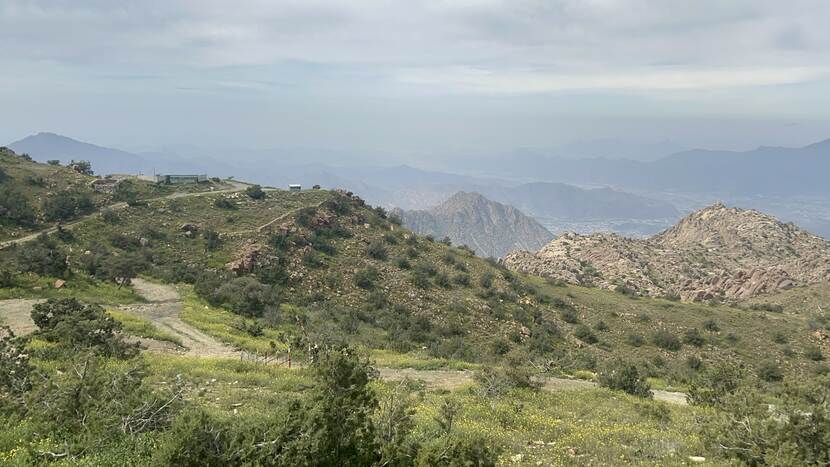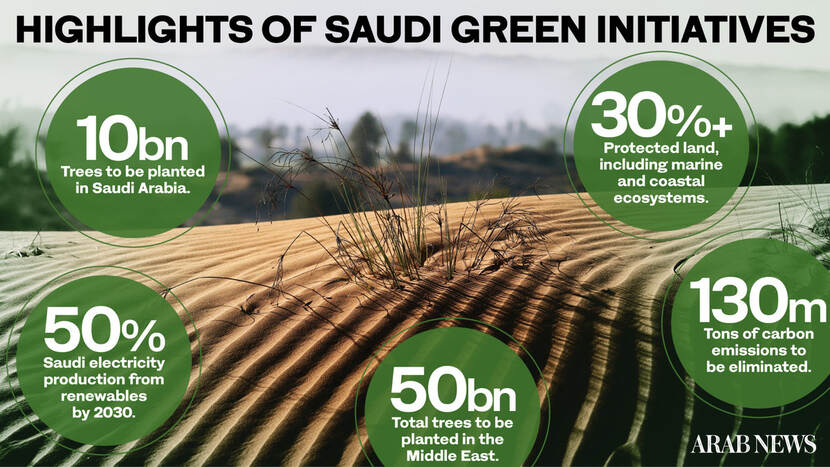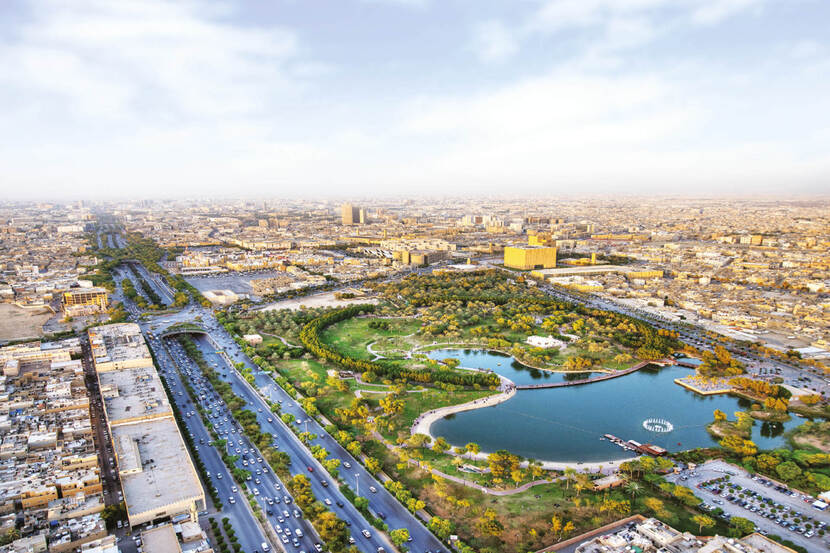Desertification in the Gulf region: initiatives to facilitate green (urban) development
While the Gulf region is often associated with vast deserts, it also contains significant green areas that are increasingly under threat. Desertification, driven by prolonged droughts and global warming, is putting pressure on these landscapes. Also, urbanization and the growing need for green spaces to improve the quality of life are pushing countries in the region to act on reforestation and green urban development.

GCC countries have launched several initiatives, aiming towards biodiversity conservation. As the largest country in the GCC, Saudi Arabia established national parks and wildlife reserves to protect habitats and species. By the year 2030, Saudi Arabia plans to protect 30% of its terrestrial and marine areas, an ambitious goal and part of Saudi Green Initiative.
March 2021 marked the launch of Saudi Green Initiative, where the country targets reducing carbon emission by 50%, planting 600 million trees and shrubs by 2030, and protecting the indigenous flora and fauna. Although green areas make up around 16% of the country, they remain relatively unknown internationally. Popular with domestic tourists, its cooler green rainy mountainous areas like Abha, Al-Baha, and Taif south-west of the country provide a break from the intense dry heat of cities like the capital Riyadh, where summer temperatures can soar up to 50°C.
The private sector in Saudi Arabia followed the government’s initiatives and launched their own initiatives. Tanmiah Food Company pledged to plant one million trees by 2025 using the recycled water from their facilities, contributing to the Saudi Green Initiative.

Pushing greenification in Saudi Arabia
In urban areas, the country is also pushing greenification. The Green Riyadh Project, for example, aims to plant 7.5 million trees across the capital. Plants are grown in nurseries outside the city, carefully cultivated through several stages before planting. Additionally, the construction of King Salman Park started in 2021, set to be the world’s largest urban park, is underway and expected to be completed by 2030. In the nurseries that will feed King Salman Park with over one million trees and shrubs, the Dutch expertise manifested through Priva’s irrigation systems and is playing a key role in these efforts.
‘Gulf countries are stepping up to tackle desertification and improve their green landscapes, both in natural and urban environments’

Mangrove restoration in the UAE
The United Arab Emirates (UAE) focuses its reforestation efforts on its natural mangrove forests, which are essential to the coastal ecosystem. The UAE aims to plant 100 million mangrove trees by 2030, in collaboration with international organizations like the Global Mangrove Alliance, a collaboration launched in 2018 that seeks to bring together NGOs, governments, scientists, industry, local communities, and funders towards a common goal of conserving and restoring mangrove ecosystems.
The parties involved in mangrove management and restoration are scattered around the country, ranging from ports authorities and municipalities to nature protection organizations, hotel chains and tourism bodies. Several Dutch companies and knowledge institutes are involved locally in various mangrove restoration efforts. The Netherlands Agricultural Network (LAN) LAN team and the economic department organized for these parties to meet and join forces. This initiative was met with great enthusiasm and will result in a roundtable discussion at the first Mangrove Conference in Abu Dhabi in December.
Wetlands International and EcoShape are NGOs that are heavily involved in mangrove restoration and have many of the companies and knowledge institutes as their members. Moreover, Dutch companies and knowledge institutions have extensive expertise in building with nature, propagating plants, working on environment and ecosystem impact studies, as well as dredging and supplementing sand as and when required to help natural mangrove growth by restoring tidal flows and stabilizing coastlines. Drones are also employed to plant seeds in hard-to-reach areas. Their hybrid engineering solutions, blending natural barriers with man-made structures, can further enhance coastal protection and biodiversity. In 2025, LAN will steer towards a prePPS for coastal ecosystems with the parties involved.
Biodiversity increasing in Dubai
The UAE’s increasing biodiversity is visible in projects like Dubai’s Al Qudra Lakes. These man-made lakes have become a popular spot for migratory birds, including flamingos, which first set foot in the UAE in the 1980s and now call the UAE their permanent home. Dutch algae management expertise by LG Sonics is applied to keep algae growth under control with ultrasonic waves, while preserving the desert landscape and its unique flora and fauna.
More information
Would you like to know more about biodiversity and greenification in the Gulf region? You can visit the country page of the Gulf region at the website Agroberichtenbuitenland.nl of the Dutch Ministry of Agriculture, Fisheries, Food Security and Nature. You can also send an email to the Netherlands Agricultural Network (LAN) team in Riyadh: riy-lvvn@minbuza.nl.
This article is part of the 13th edition of the e-magazine Agrospecial, titled "Peace with Nature: Global Biodiversity Commitment" (originally published on October 9, 2024).
In this edition, the Netherlands Agricultural Network (LAN) explores the crucial role of biodiversity in agriculture and nature in the context of the COP16 of the Convention on Biological Diversity (CBD) in Colombia. Agricultural Counselors from over 18 countries share their involvement in initiatives that foster the protection and sustainable use of biodiversity, highlighting the complex interdependence between biodiversity, water and soil management. In these efforts, cooperation, innovation and knowledge exchange are key, and LAN plays a crucial role in mainstreaming this global commitment.